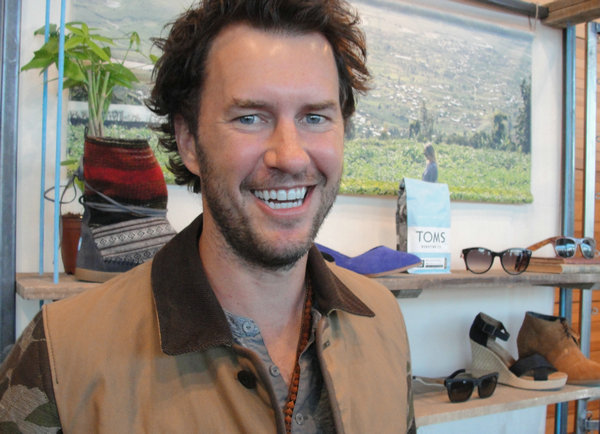 |
|
Toms founder Blake Mycoskie and his company are catching on to the power of mixing business with social good.[Photo provided to China Daily] |
Blake Mycoskie talks about his shoe-giveaway company and addresses its critics who took issue with the why and how of Toms' philanthropy.
In Argentina, South Africa, Rwanda and elsewhere around the globe, there's something that sticks out for Blake Mycoskie about the one-for-one shoe company, Toms, he started in his Venice, California, apartment 10 years ago.
While the idea was to give away one pair of his unique canvas slip-ons for every pair sold, another benefit emerged.
"Some of my best memories from the early giving trips are after we give the children shoes, they always want to play soccer," Mycoskie said in a recent interview from Los Angeles. "It's so cool that this single sport kind of unifies all the children we serve around the world."
The love of soccer remains, but much has changed for Mycoskie since 2006, when he decided on the for-profit model of giving through shoes.
For starters, he sold a 50 percent stake in his company to the private equity giant Bain Capital LLC nearly two years ago. On the personal side, he became a dad at precisely the same time, a huge motivator to give up some of the day-to-day responsibilities of Toms, now a force that includes a great variety of footwear, along with eyewear, bags and coffee.
Mycoskie, who isn't CEO but still has a hand on many fronts, including design, would not disclose his net worth, but with expansion came more money for projects.
In addition to shoes, the company's other wares help provide clean water, eye surgeries and the availability of safer births around the world. With his personal wealth, estimated at $300 million when he sold to Bain, he and his wife help young, socially minded entrepreneurs like he was when he hit on shoes as his focus while watching kids go barefoot as he traveled in Argentina.
There have been bumps along the way. Critics have been brutal.
"Every company has them," Mycoskie says. "I really kind put them in two categories. One is the criticism of, OK you are providing aid and if you are really serious about poverty alleviation, aid is not the only answer, and actually that criticism led us to change our supply chain to create the factory in Haiti, do the factory in India, do it in Kenya, Ethiopia, all these places."
Now, about 40 percent of all shoes given away are made in the countries where they are distributed, he says.
And the second kind of critic?
"Now the other criticism I think comes from saying that shoes aren't really needed, or just give them money, or why shoes in the first place," Mycoskie says. "I never set out to change the world in terms of alleviating poverty. I saw kids who needed shoes to go to school."
Mycoskie acknowledges that as "chief shoe giver," his preferred title, things were chaotic in the beginning. There was manufacturing, for one, and how to remain ethical and profitable, along with distribution challenges that once had a partner request money for a rented donkey to get the shoes where they needed to be.
To date, Toms has given away about 60 million pairs of shoes. The company estimates that through cataract and other surgical procedures, the company has helped restore sight to about 400,000 people, along with providing more than 335,000 weeks of safe drinking water and supporting safe birth services to about 25,000 mothers.
|
|
|
|
|
|
|
|
